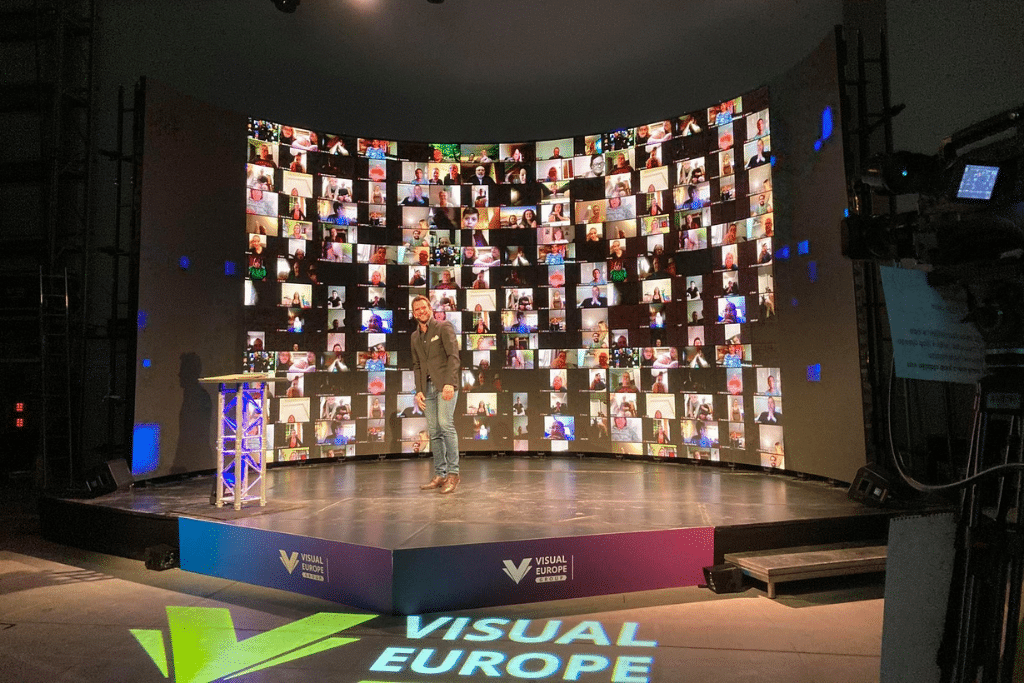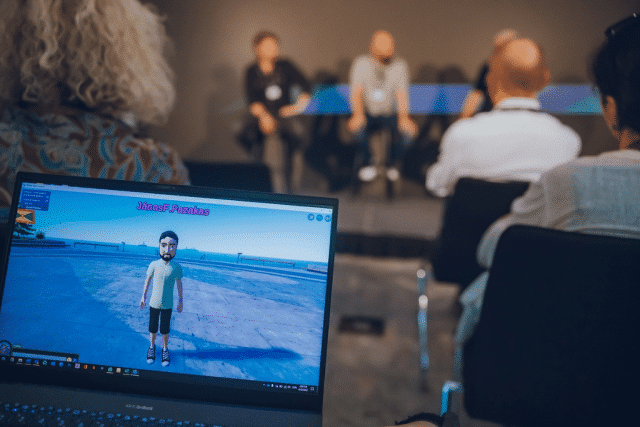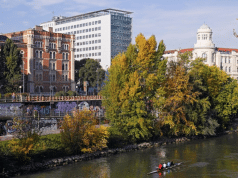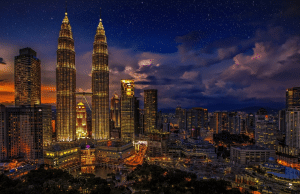AI in marketing and sales
A significant part of the research is devoted to the impact of artificial intelligence on event organising. The first question already gave a telling insight into the future. Respondents were asked to explain what keeps them up at night. Time management took first place, selected by 20.5% of respondents, followed by the power of AI (18.3%) and budgets (12.8%). Evidently, AI has become a pervasive topic for event organisers. We were equally surprised to learn event organisers underscored implementing new technologies as a dire challenge (42.6% of respondents).

| 48.7% | Chatbots (Chat GPT, Chat Spot, Drift, etc.) |
| 23.1% | Writing assistance tools (Grammarly, Word.ai, etc.) |
| 15.4% | Other (most stated that they do not use AI) |
| 10.3% | Tools for generating texts (Jasper, Copy.ai, Fraser, etc.) |
| 2.6% | Visual tools (Canva, Midjourney, etc.) |
| 0.0% | Audio tools (Speechify, Descript, etc.) |
| 0.0% | PR tools (Howler AI, Otter, etc.) |
n=121 (25 January 2024)
To take the study further, we needed to learn which AI tool has become the dominant force on the market. ChatGPT finished head and shoulders above the rest, as expected. How did others fare?
| 53.8% | ChatGPT |
| 41.0% | Canva |
| 35.9% | Grammarly |
| 33.3% | None |
| 15.4% | Midjourney |
| 10.3% | Bard.ai |
| 8.2% | Semrush |
| 7.7% | Dall-e |
| 5.1% | Surfer CEO |
| 4.8% | Jasper |
| 2.6% | Copy.ai |
| 2.6% | Descript |
n=121 (25 January 2024)
Chatbots and tools for generating texts are currently the most used AI tools. Several respondents wrote they did not even know some tools were AI-powered.
We did not stop our exploration of AI trends there. We asked event organisers what they used AI for in the past year. Here are the results:
| 51.3% | Editing and refining texts |
| 34.8% | Generating images |
| 30.65% | Developing new ideas |
| 27.5% | Preparing scenarios |
| 23.1% | Producing ad texts |
| 20.5% | Revising and rewriting texts |
| 12.8% | Producing customer support texts |
| 5.1% | Preparing FAQ texts to offer support to attendees |
n=121 (25 January 2024)
| 4.10 | CRM tools (customer relationship management) |
| 3.74 | Work and Project Management |
| 3.64 | Web analytics (Google Analytics) |
| 3.54 | Social media management and monitoring |
| 3.53 | Engagement and Lead Generation |
| 3.51 | Email marketing (Mailchimp, etc.) |
| 3.51 | SEO tools (search engine optimisation) |
| 3.38 | CMS (content management system) |
| 3.28 | Analytics and conversation rate optimisation (CRO) |
| 3.28 | Data analysis and visualisation |
| 3.07 | VR (Virtual Reality) |
| 2.97 | Webinar platform |
| 2.90 | E-commerce platforms (Woocommerce, Shopify) |
| 2.85 | Multi-function marketing suite (e.g. Adobe Marketing Cloud, Salesforce Marketing Cloud, Oracle Marketing Cloud) |
| 2.82 | AR (Augmented Reality) |
| 2.69 | Marketing automation platform (e.g. Marketo, Salesforce) |
n=121 (25 January 2024)
Perhaps the most thought-provoking question in our study was: Which technologies will impact event organising in the future? The answers below are self-explanatory.
| 79.5% | Generative AI |
| 30.8% | Augmented reality/virtual reality |
| 20.5% | 5G |
| 17.9% | 3D printing |
| 17.1% | Blockchain technology |
| 15.4% | Advanced robotics |
| 15.2% | Nanotechnology |
| 12.8% | Metaverse |
| 10.3% | Brain-computer interface |
| 7.7% | Quantum computing |
| 7.5% | NFT/cryptocurrency |
n=121 (25 January 2024)
More than one respondent wrote that all technologies combined will have a decisive impact on our future. That is perhaps the most accurate answer of all.
It is plain to see AI was the most-used word last year. We expect it to remain highly relevant in 2024, too. Most colleagues who took the survey think alike. Nonetheless, event organisers are known to implement new technologies in every nook and cranny of event design. Many technologies have stayed with us, while some have irrevocably ended on the depot of failed tech innovations.
Our agency leverages several technologies, which we connect and integrate depending on the needs and wishes of clients.
1. From video mapping to interactive mapping
The technology of video mapping is constantly evolving. New developments have given rise to incredibly complex and interactive installations. By marrying creativity with advanced technology, we can use video mapping for complex projects, including video mapping on aeroplanes.
2. Platforms for hybrid events
Hybrid events remain relevant and are becoming further interactive with new tools. Resourceful event organisers are adept at leveraging them and making Zoom calls a memorable experience. Streaming content can also facilitate additional income after an event has concluded.
3. Tools for interacting with attendees
Slido and similar tools are developing at an impressive rate. Using such tools has become a must for engaging participants.
4. Personalisation tools
RFID (Radio-Frequency Identification) and NFC (Near Field Communication) enabled logistical processes to be personalised years ago. This year, we foresee further development of such tools.
5. Grand comeback of mobile apps
Mobile apps for events have made a great comeback. As a digital communications centre, they are incredibly effective for direct communication with participants. In addition, great mobile apps offer a tailored, personalised user experience. Within our agency, they play a crucial role in supporting matchmaking.
6. Automatisation of registration
In 2024, we expect technologies for the registration processes to become incredibly advanced. QR codes seem like kindergarten compared to the latest apps utilising face-recognition technology.
7. Mobile apps for matchmaking
Matchmaking apps have developed to the level they rendered business cards obsolete. Technology-wise, this is one of the most dynamic fields of event organising.
8. Sustainability reporting tools
As there wasn’t a single tool on the market for writing sustainability reports, we developed our solution – Planet Positive Event. The web app enables event organisers to acquire a sustainability rating in line with ESG Standards.

Technology is our aide-de-camp
Technology cannot replace the authentic and profound human ties we create in person. Millennia ago, our ancestors began convening next to fires to share stories. Since then, humankind has mastered the art of events and meetings to the point they have transformed into a universal language, like music. Although the marvellous improvements technology heralds are incredible, new innovations cannot satisfy us as genuine human connections do. The problem with technology is that we are bringing up people and colleagues who will find human connections exhausting, preferring to avoid them. Do you want such colleagues in your company? We should aspire for more eye-to-eye contact instead. A full-fledged event organiser talks with his soul and body. He leaves his heart on stage. At present, I see no technological alternative or shortcut yet. Hard work, diligence, authenticity, naivety and the transfer of knowledge and practical experience, coupled with cooperation and partnerships, remain the key to a successful event. When an event organiser has mastered the chemistry of an event, they can create miracles with the attendees (perhaps with a few tech wizardries, too).














